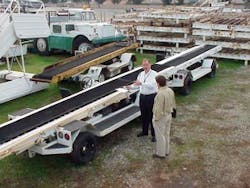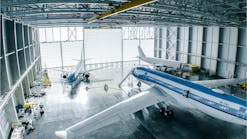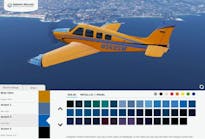Recognizing value in surplus equipment has been around since cavemen traded their flints and spears. In today's economy companies buy or trade used equipment for a variety of reasons, ranging from the need for quick delivery to lower cost. Although not wholeheartedly embraced by the industry, the surplus GSE market has a lot to offer.
We talked with Roy McDaniel, surplus GSE sales manager for American Airlines, about recent changes in the GSE industry and he says, "The world is changing in buying and selling used GSE and it has a lot to do with planes that were originally sold in the United States and are now being re-sold internationally. Additionally, phone and fax used to be the main form of communication for sales, but not anymore. The Internet is quickly taking over."
McDaniel recommends going through a skilled GSE reseller for international purchases. He feels that the extra service that the GSE reseller gives in testing, packaging, shipping and customs is well worth the few extra dollars. He also recommends only dealing with reputable companies that offer warranties and can give references. McDaniel's motto: pay a little more, have less problems later.
The authors of this article have over 20 years experience in selling used equipment, and would like to offer some tips that we hope will help you benefit from our experience. In what follows, we would like to highlight a few things you need to remember when purchasing used equipment.
- REFERENCES - Always seek out a reputable supplier that will provide you with references. This way you can make sure they stand behind their product and won't waste your time or worse, steal your money.
We heard of a company who purchased what was supposed to be "new in the box" surplus equipment. Upon receiving the product they found it was in a new box, but the equipment was obviously used and in very poor condition. Upon calling the vendor to discuss the situation, he replied that it "once was new!" Well, they once did business with that company, but never again. - INSPECTION - Whenever possible, contract out or personally inspect the equipment, especially if you are dealing with a company without references.
In the past we have seen pictures of towbars that appear to be in great condition, however upon inspection, discovered the undersides were severely damaged from being dragged along the tarmac. Inspection can prevent a costly and time-consuming problem from happening! - BRAND NAMES - Off-brands are harder to support, so stick with manufacturers and models you are familiar with. In the long run these products will also carry a higher resale value when you choose to re-sell the equipment in the future.
Stewart Stevenson, FMC and Hobart are easier to support than off brands. Remember: The BWM cars get resold but Yugos get scrapped! - SERVICE & SUPPORT - Vendors who provide quality service and stand by their warranty and products are more important than price. Knowing you will receive long-term support rather than being stuck with a problem and no recourse is much more important than saving a few dollars on the initial transaction.
We have heard horror stories about companies that receive defective equipment with no means of support. One company purchased equipment which they did not inspect. The unit arrived, and upon discovering that it wasn't functioning properly, tried to contact the vendor. To their dismay, the vendor's phones were suddenly disconnected, and had apparently disappeared from the face of the earth. Do not let this happen to you. - AGE - The age of equipment is directly related to the amount of life you expect to get out of it. In other words, if you plan to use this piece of equipment constantly, then you should spend the extra money on a newer model to ensure its reliability.
Five year-old tugs will obviously have a longer life span than 25 year-old tugs. The last thing you want is to purchase an item and have it stop working within a few months. Always take age and wear into account when purchasing used GSE. - REDUNDANCY - If your business cannot afford to be stopped, even temporarily, work a back-up unit into your budget. A used piece may be your best solution.
We recall hearing a story of a company almost forced to rent a tractor a scant few days after purchasing a brand new one, because there was a faulty switch in the new unit. The rental costs would have been staggering, but the old tractor that was to be replaced saved the day. - ADDITIONAL EXPENSES - Freight, taxes and customs fees can add up, so always take into account the location of the item when considering a purchase. Long-term maintenance costs should also be considered.
Include $2,000 for freight, $1,000 for customs, $500 crating and all of a sudden you've purchased a $13,500 tractor, not the $10,000 you had planned in your budget. - FREIGHT DAMAGE INSURANCE - We recommend digital photos prior to shipping and again at delivery, which can help if you need to file a freight damage claim. It is important to know that if you sign a freight bill without indicating damage then you cannot collect insurance and will have a very difficult time filing a claim. Typically one percent is all you have to pay to insure your equipment. One percent insurance is a small price to pay if an item is damaged during shipping.
A customer once signed off on a piece of equipment only to discover later that damage had occurred during shipping. Since they signed off, they had no recourse to file a shipping damage claim. Take the ten minutes to inspect the equipment before the truck driver leaves - that ten minutes could save you thousands of dollars! - TRAINING - Remember that the labor the equipment saves you is your true business cost savings! This means that it is better to buy equipment your staff is familiar with to save on training and maintenance expenses...
One company purchased a tug and an untrained employee crashed it into a plane causing extensive damage. The cost to repair the plane far outweighed the original cost of the tug itself.
In the end we hope this article illustrates that in the long run when buying surplus equipment the real value lies not only in the equipment, but also in the vendor you choose. The monetary worth is best measured by providing the most effective combination of customer service, product quality, availability, employee training and finally, price.
Please don't hesitate to contact us. If you have any questions or comments, simply visit www.centurygse.com.Good luck with all your GSE endeavors!





